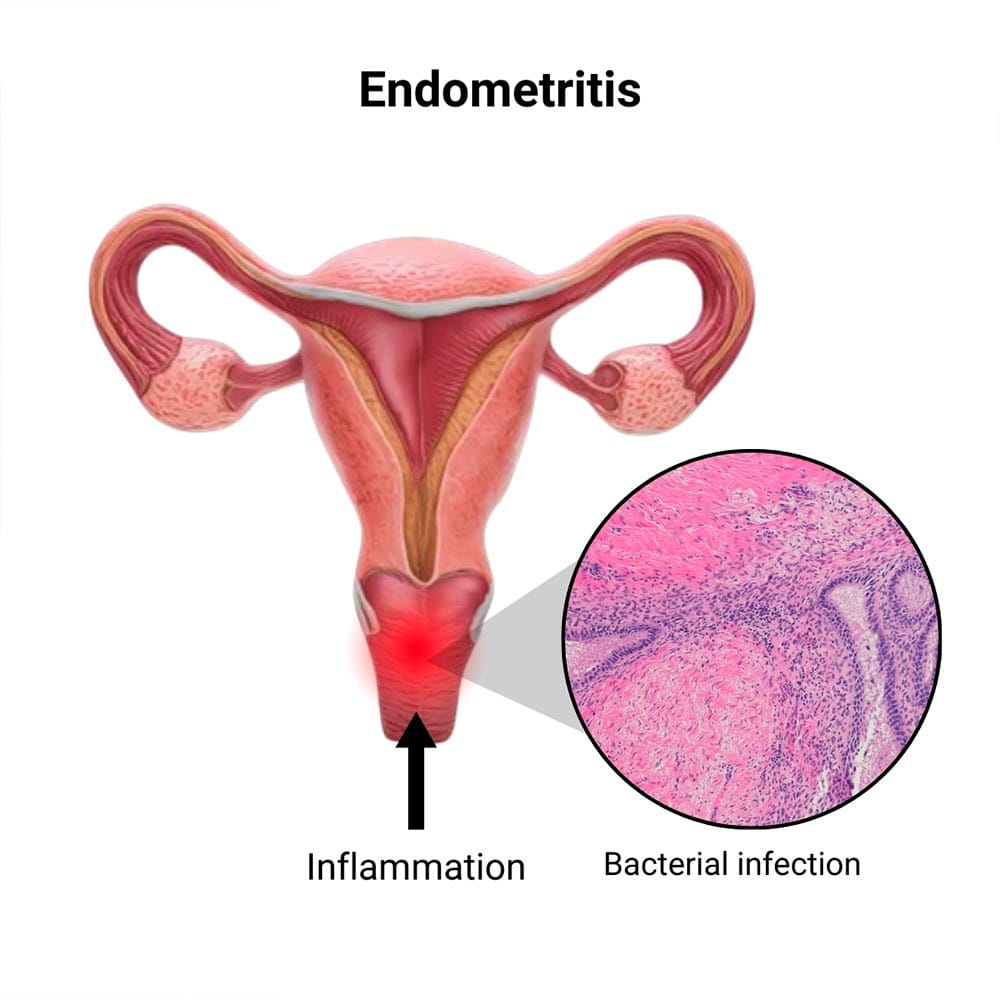What Is Endometritis?
 Endometritis is a condition in which the lining of the uterus, called the endometrium, becomes inflamed. It causes, among other things, fever, bleeding and pelvic pain. This condition is common but misunderstood and affects millions of women globally. Chronic endometritis can lead to serious impacts on your health, including ectopic pregnancy and cancer. The good news is that this condition is treatable with the right interventions.
Endometritis is a condition in which the lining of the uterus, called the endometrium, becomes inflamed. It causes, among other things, fever, bleeding and pelvic pain. This condition is common but misunderstood and affects millions of women globally. Chronic endometritis can lead to serious impacts on your health, including ectopic pregnancy and cancer. The good news is that this condition is treatable with the right interventions.
Cohen Medical Practice (CMP) in Midtown New York City is a preferred medical provider for effective solutions to endometritis and other feminine problems. This team is led by the accomplished OB-GYN Dr. Felix Cohen. They offer the depth of skills and experience necessary to address your health needs, from annual gynecological exams to specialized services and procedures.
What Causes Endometritis?
Endometritis develops when bacteria enter the uterus and cause infection and inflammation. This infiltration often happens during or after childbirth, miscarriage or abortion. It can also happen because of a pelvic infection.
Postpartum endometritis happens when there is a bacterial infection of the uterus, especially when there are tears or lacerations. It often happens when the uterus doesn’t return to its normal size as expected.
Some of the risk factors that may make you vulnerable to endometritis include:
- Post childbirth infection. Bacterial infection after childbirth from a vaginal delivery, cesarean section or other obstetric procedures can leave you with an infection.
- Pelvic inflammatory disease. PID affects the reproductive organs including fallopian tubes, ovary and uterus.
- Sexually transmitted diseases. Untreated, diseases such as gonorrhea, herpes and chlamydia can spread to the uterus and cause inflammation.
- Weakened immunity. People with conditions that lower body immunity, such as HIV or diabetes are more vulnerable to endometritis.
What Are the Signs of Endometritis?
The onset of endometritis can be sudden or gradual in appearance after childbirth, miscarriage or abortion. The symptoms of endometritis also mimic those of other conditions like endometriosis and adenomyosis. A fever or elevated temperatures above 100.4°F are some of the differentiating symptoms of endometritis. This comes about as the body fights against the infection.
Other symptoms may include:
- Pelvic pain
- Abnormal bleeding
- Abnormal discharge
- Painful urination
- General malaise or fatigue
What’s the Difference Between Acute and Chronic Endometritis?
Acute endometritis is a sudden and severe inflammation of the uterus that happens after an obstetric procedure, an abortion, childbirth or miscarriage. It happens when there’s significant infiltration of bacteria in the uterus. The symptoms are sudden and intense.
Chronic endometritis occurs because of persistent infections in the uterus, which is attributed to untreated underlying causes. It can lead to more complex problems in the reproductive system.
Some of the symptoms of chronic endometritis include:
- Recurrent pelvic pain that can last for months
- Persistent abnormal uterine bleeding
- Infertility that may be caused by the scarring of the endometrium
- Recurrent miscarriages
How Do I Confirm If I Have Endometritis?
Your CMP gynecologist confirms a case of endometritis by reviewing your medical history, performing a physical exam and using diagnostic tests. Your doctor typically starts by asking you about obvious and visible symptoms. They also ask about your medical history, especially about STDs.
The gynecologist performs a physical exam to check for visible abnormalities like swelling, tenderness and abnormal discharge.
Some of the diagnostic tests he relies on include:
- Endometritis ultrasound. This imaging test uses high-frequency sound waves to visualize the uterus and the surrounding tissues.
- Blood test. A lab test is useful to check for an infection by looking at the count of white blood cells and C-reactive protein levels.
- Endometrial biopsy. This test uses a sample tissue of the endometrium to check for abnormal cell growth.
What Are the Treatment Options for Endometritis?
Your doctor chooses the most effective treatment options considering the severity of the infection, any underlying causes and your overall health. Mild cases are treated with prescription drugs while severe cases may require surgical intervention.
Endometritis antibiotics such as doxycycline, ceftriaxone or metronidazole are the first line of treatment against bacterial infection.
Other treatments include:
- Pain management. Drugs such as ibuprofen for relieving pelvic pain usually are sufficient while the infection is being treated.
- Surgical intervention. A D&C or hysterectomy removes infected and damaged tissue.
- Hormonal therapy. Hormonal replacement therapy may be necessary to regulate menstrual cycles.
How Can I Reduce the Risks of Postpartum Endometritis?
Proper gynecological care during pregnancy and after childbirth is key to reducing the risks of developing an infection after childbirth. The most effective risk strategies aim at preventing exposure to bacteria, which prevents infiltration into the uterus.
Proper wound care and following the care instructions after a cesarean section or episiotomy is crucial to prevent bacterial infection.
Other steps you can take include:
- Practicing good hygiene, such as washing your hands and cleaning the perineal area
- Following post-natal instruction, which includes getting regular exercise and maintain a healthy diet
- Attending your required checkups to review your healing progress and undergoing early interventions if there’s a problem
CMP New York is a trusted medical provider with the proper and effective treatments for acute endometritis and chronic endometritis. Contact Cohen Medical Practice (CMP) today to get an accurate diagnosis of your symptoms and proper treatment.

